Once again I invoke Hamlet in my blog title. But the famous words do aptly convey the dilemma faced by many amongst us regarding the COVID-19 vaccination. After the start of it’s COVID vaccination drive in January ’21, India has so far (till April 20th) managed to fully vaccinate nearly 1.74 crore people (two doses) and nearly 10.96 crore have received the first dose. It is important to realize that unless majority of the population has immunity against the virus (herd immunity), either by natural infection or by vaccination (the latter will help it achieve faster and safer), the pandemic is never going to end. Though there is no magic number to achieve this herd immunity, it is being projected that atleast 70% population needs to be vaccinated to halt the pandemic. With a current population of nearly 138 crores, we sure have an enormous task at hand and the vaccine hesitancy/dilemma will only add to our woes. I am not into active management of COVID-19 patients but being a doctor, I come across many queries related to COVID-19 vaccination. Here’s my bit to simplify a few.
“I hear about different types of COVID-19 vaccines – Covishield, Covaxin, Pfizer, Moderna, Johnson and Johnson. I am confused..?”
To understand this, one has to know about the different technologies used presently to develop COVID-19 vaccines –
(1)Whole virus based vaccine
(a)Using a dead virus
Here, the corona virus is completely inactivated/killed using certain technology, an adjuvant is added to it to increase the immune response and then injected in human body. This is a traditional way to prepare vaccine and is believed to be the safest. However, the immune response generated by such a vaccine is unpredictable and can be weak. Two such vaccines being used currently in clinical practice are –
- Covaxin (Bharat Biotech, India)
- BBIBP-CorV (Sinopharm, China)
(b)Using a live attenuated virus
Here, the virus is made less potent (but not killed) using certain technology and then injected in human body. Such a vaccine can generate a good immune response. But, the SARS-COV2 is a mRNA virus and can mutate if it comes in contact with another strain. Hence, safety is a major concern with this type of vaccine. There is no such vaccine available currently. Few are being attempted but are in the pre-clinical stage of trials.
(2)Recombinant viral vector based vaccine
Here, a modified, harmless version of a different virus is used as a “vector” or “carrier”, to deliver immunity instructions to cells in the human body. The viral vector delivers a coded message which causes human body cells to produce the copies of the coronavirus spike proteins. This, in turn, triggers an immune response in human body leading to production of neutralizing antibodies which help fight off the COVID-19 infection. Three such vaccines are available for clinical use presently –
(a) Oxford – Astrazeneca vaccine – It uses chimpanzee adenovirus (ChAdOx1) as the viral vector. It is sold under the brand name Covishield in India and is manufactured by Serum Institute of India. In Europe and elsewhere, it is available under the brand name Vaxzevria.
(b) Sputnik V (Russia) – It has been developed by the Gamaleya National Research Institute of Epidemiology and Microbiology, which has also been involved in developing vaccines for Ebola and MERS. It uses 2 viral vectors – both human adenoviruses (common cold virus) – Ad26 and Ad5. Ad26 based vaccine is given on on Day 1 and Ad5 based one is administered on Day 21. A single dose version Sputnik-Light is being introduced soon.
(c) Johnson and Johnson – It uses human adenovirus (Ad26) as the viral vector and is available under the brand name Janssen COVID-19 vaccine.
Hyderabad based Biological E. Ltd has tied up with the Janssen Pharmaceutical Companies to manufacture the above mentioned vaccine under the brand name Bio E vax in India – it has received the nod for phase 3 trials in India.
The immune response to all such viral vector vaccines is good and the efficacy is more than 70%. However, there are rare instances of blood clotting in case of Astrazeneca and J&J vaccine (will discuss this point in a subsequent question).
It is worthwhile mentioning here that Bharat Biotech is working on an intra-nasal vaccine based on such adenovirus vector technology. If successful, it is believed to be a potential game changer since it will produce immune responses at the site of infection (in the nasal mucosa) thereby blocking both infection and transmission of COVID-19.
(3)Nucleic acid based vaccine
Here, an encoded messenger RNA (mRNA) or DNA is delivered to human body after they are combined with lipid nanoparticles. This mRNA instructs human body cells to make copies of coronavirus spike proteins, which in turn leads to production of neutralizing antibodies. These vaccines are safe (non-infectious), highly effective (more than 90%), can be produced rapidly and administered multiple times. Two such vaccines are available in clinical use presently –
- Pfizer – BioNTech vaccine
- Moderna vaccine
(4)Protein subunit vaccine
This vaccine contains full-length coronavirus (CoV-2) S protein or portions of it with the goal of inducing neutralizing antibodies. However, they are poorly immunogenic and generally require repeated administration. Novovax Covid-19 vaccine is one such and is undergoing trials in India in collaboration with Serum Institute of India under the brand name Covovax.
(5)Virus like particles (VLP)
VLPs are spontaneously forming particles composed of several structural viral proteins. Currently, none such is available for clinical use.
“I know few people who got COVID infection after first dose/second dose of vaccination. Then why should I get vaccinated?”
The maximum immunity post vaccination is attained 2 to 4 weeks after the second dose. So the person known to you who developed COVID infection may not have taken both doses of the vaccine.
If the person has developed COVID infection following both doses, then he/she is amongst the rare instances of “vaccine breakthrough cases”. It is possible that this person was infected just before or just after the second dose and got sick, since (as mentioned earlier) it typically takes a minimum of 2 weeks for the body to build protection after the second dose.
There is also a possibility of a “new variant” causing this infection. But the good news is that all vaccines offer some degree of protection against the new variants too, thereby ensuring that such “breakthrough case” is a “mild” one and will not need hospitalization.
The Centres for Disease Control and Prevention (CDC) has so far reported approximately 5,800 so-called “breakthrough infections”, out of the nearly 77 million (7.7 crore) individuals in the United States who have been fully vaccinated.
In India, following image gives an idea regarding such breakthrough cases – these are indeed very less and mostly “mild”.
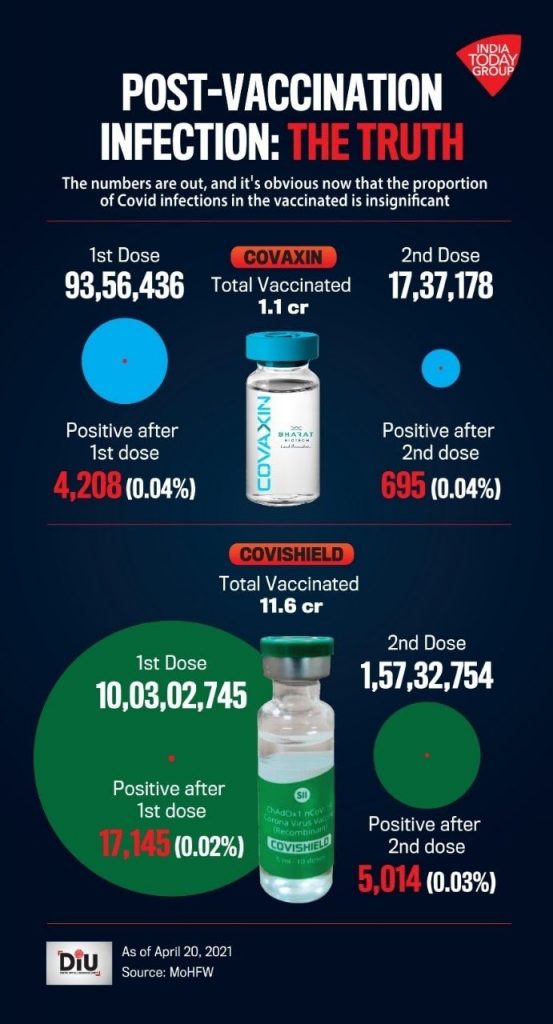
“I know a few people in whom the RT-PCR turned out to be positive due to vaccination. I am not keen to get vaccinated.”
As described earlier, none of the vaccine types can cause COVID infection and thereby a positive RT-PCR. Such a person has probably contracted the virus just before or after vaccination and developed infection before the vaccine immunity could set in. So do not worry on this count at all.
It would be worthwhile mentioning here that some of the vaccination centres are indoors/crowded. Make sure that you follow the golden rule of face mask and social distancing, else, you might end up catching infection at vaccination centre.
“I am worried I will get fever, bodyache after the vaccination.”
No pain, no gain. Few side effects such as minimal pain at injection site, low grade fever, bodyache etc may be experienced by some. However, these are mild, self limiting and respond to a single dose of oral paracetamol. So relax. Infact, such mild symptoms are a welcome sign that your body is producing an immune response (this, however, doesn’t mean that the immune response would be any less in those not having side effects).
“I have allergy to certain medicine/food/dust etc. I cannot take the vaccine.”
If you have had a severe allergic reaction to any medicine or food item in the past, you need to consult your doctor prior to vaccination; if it is something of a mild/ routine thing, you need not worry (you can refer to the Ministry of Health and Family Welfare guidelines link shared at the end of this article for more clarity in this context).
“I need to stop my blood thinners before vaccination.”
Many elderly patients or those who suffer from heart disease/ hypertension/ brain diseases are on blood thinners. As per the official guidelines, there is no need to stop these before or after vaccination. Despite this, at many centres, patients are asked to withhold them for 3 days prior to vaccination. This can cause more harm than good in someone. If doubt still persists, one can always consult the regular physician in this matter before complying blindly with the instructions given at local vaccination centre.
“If I have/had COVID-19 infection, should I take the vaccine and when?”
If someone is having active COVID-19 symptoms, the person needs to wait for 4 to 8 weeks (I would go with 8 weeks) after recovery and then get vaccinated. A person with a history of past infection should also get vaccinated since this will help strengthen the immune response. Also because, there is still no clarity regarding how long the immunity lasts after the natural infection.
“If I get COVID-19 infection after 1st dose of vaccine, should I take the 2nd dose and when?”
The answer is same as above – wait for 4 to 8 weeks after recovering from the infection and then take the 2nd dose.
“If I am unable to take the 2nd dose on time due to vaccine shortage, how long can I delay it? Will I need to take both doses again?”
As we know, in India two COVID-19 vaccines are available – Covishield and Covaxin. Following the recent directives by the Central government, in Maharastra the second dose of Covishield vaccine is now being given between 6 – 8 weeks after the first (initially it was at 4 weeks). For Covaxin, the second dose is being given 28 days after the first dose, as was being done earlier. There is currently limited information on the effectiveness of receiving the second shot earlier or later than recommended. Presently, if you do receive your second shot of COVID-19 vaccine earlier or later than recommended, you do not have to restart the vaccine series. This guidance might be updated as more information becomes available.
“Can I drink alcohol after vaccination?”
According to experts, alcohol does not decrease the effectiveness of vaccines. And how soon can one start? Well, it is advisable to wait for a minimum of 2 to 3 days, since you wouldn’t want to celebrate too soon and get up with a hangover which cannot be differentiated from the vaccine side effects.
“Should I get my neutralizing antibody titres checked after vaccination?”
There has been a trend to check the neutralizing antibody titres in blood post vaccination. There is no official recommendation/guideline regarding this. It doesn’t make much sense though, since the vaccine effectiveness is not merely due to the antibodies. The helper T cells/other immune mechanisms also play a role and these aren’t being evaluated. Ditch this one.
“I have heard/read about deaths after vaccination. I am worried about the blood clotting side effect of some vaccines.”
This, according to me, is the Achilles heel of the COVID-19 vaccination drive. Yes, there have been instances of blood clotting, especially in the brain veins (cerebral venous sinus thrombosis), following Astrazeneca vaccine (sold under brand name Covishield in India). However, these have been found to be rare and the vaccine is still under use since the benefits outweigh the risk. I will try to put forth the present scenario related to this in some parts around the globe –
(1)Europe
The EU (European Union) regulatory body was the first to red flag this complication. The European Medicines Agency (EMA) has asked those receiving the Astrazeneca vaccine to remain aware of the possibility of very rare cases of blood clots combined with low levels of blood platelets occurring within 2 weeks of vaccination. These clots occur mostly in brain veins (cerebral venous sinus thrombosis) and abdomen (splanchnic vein thrombosis). So far, most of the cases reported have occurred in women under 60 years of age within 2 weeks of vaccination.
Based on the currently available evidence, specific risk factors have not been confirmed. The EMA has hence advised that patients should seek medical assistance immediately if they have the following symptoms after vaccination –
- shortness of breath
- chest pain
- swelling in your leg
- persistent abdominal (belly) pain
- neurological symptoms, including severe and persistent headaches or blurred vision
- tiny blood spots under the skin beyond the site of injection
Following occurences of such rare blood clots, a recent study conducted at Oxford University (yet to be peer reviewed) has observed that the chances of blood clotting in brain veins after the 1st dose of Astrazeneca vaccine is 5 in a million whereas in COVID-19 patients it is 39 in a million (nearly 8 times more) vaccine. For mRNA vaccines (Pfizer/Moderna), the risk is 4 in a million.
Since the chances of blood clotting after COVID-19 infection is way more than the extremely rare ones after vaccination, it is presently concluded that the overall benefits of the vaccine in preventing COVID-19 outweigh the risks of side effects. As a result, the Astrazeneca vaccine is still under use in Europe, albeit, in those above 60 years of age.
(2)United Kingdom
Britain’s medicines regulator has revealed that here have been 168 major blood clots following the 1st dose of Astrazeneca vaccine. This amounts to 7.9 clots per million dose. There have been 21.2 million first doses of AstraZeneca’s shot given in Britain’s rollout, with all except one of the side effect case reports coming after a first dose. The total number of deaths, so far, have been 32. Officials have emphasised the side effect is “vanishingly” rare and advised that most people still get the shots. However, the under-30s have been advised to receive an alternative to the AstraZeneca-Oxford vaccine. This is due to that age group’s low risk from COVID-19, combined with Britain’s low prevalence of infection.
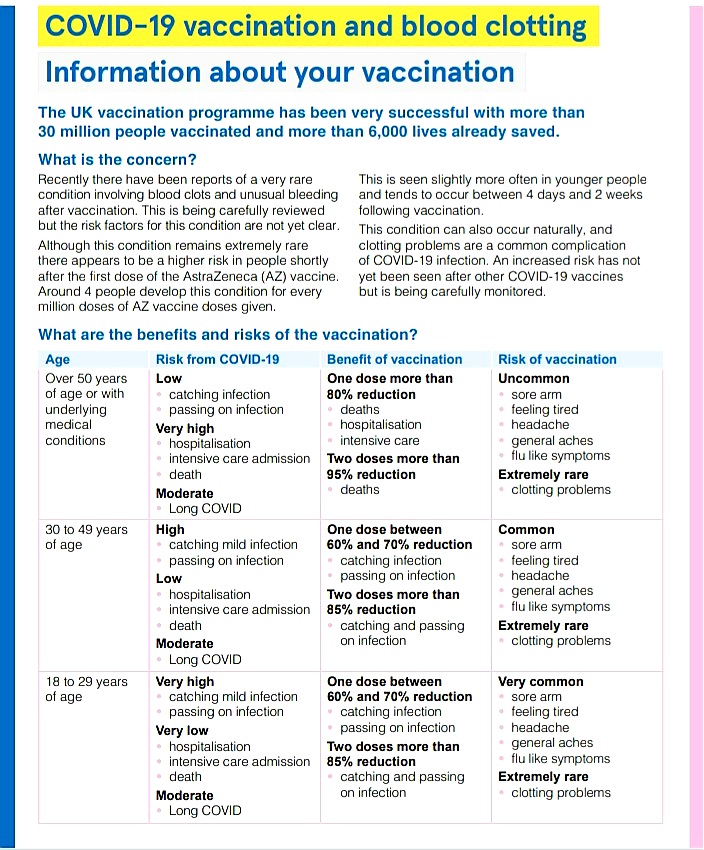
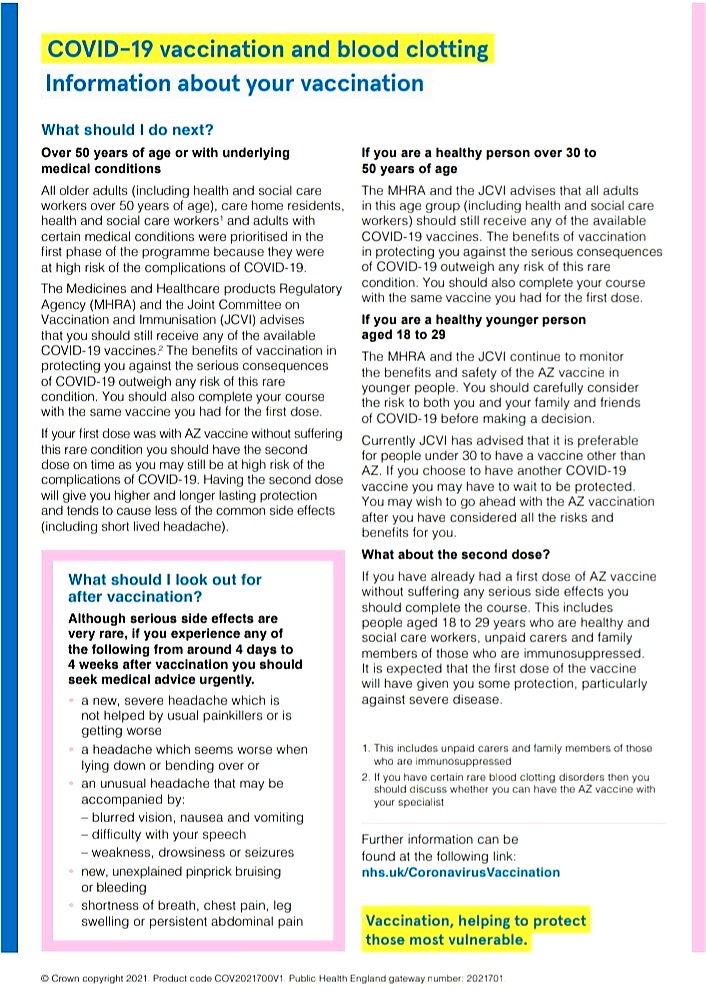
(3)United States of America
The Astrazeneca vaccine is not yet rolled out in USA. However, blood clotting problem has been observed in the J&J vaccine being used there. As of April 12 2021, out of nearly 6.8 million people in US who received the J&J vaccine, 6 cases of blood clotting in brain were reported. In this case, however, a review is underway and use of the said vaccine is presently paused in US.
Regarding the Pfizer and Moderna mRNA vaccines – whether they cause such blood clotting – in the US, where more than 180 million doses have been administered, the Centers for Disease Control and Prevention (CDC) says there have been zero cases reported. The European Medicines Agency (EMA) has however reported 25 cases with Pfizer and 5 with Moderna.
(4) India
Now the all important question – what are Indian statistics for such complication in Astrazeneca vaccine (used under the brand name Covishield)?
A presentation made to the National AEFI (adverse event following immunisation) Committee on March 31 2021 recorded that there had been 180 deaths till that time and three-fourths of the deaths happened within three days of the shot. Even as AEFI deaths are reported daily, causality assessment by the National AEFI Committee appears to be lagging.
Many of the AEFIs and deaths reported in India bear striking similarities to those recorded in the European Union and the UK. Public health activists who have been tracking adverse events following immunisation (AEFI) in the ongoing covid vaccination effort have repeatedly sought greater transparency in AEFI investigations and more rapid causality assessments to help inform vaccination policy. Since Covishield is the same vaccine as the AstraZeneca one, warnings related to the rare conditions flagged by Europe and UK, information for vaccine recipients and the public about when to seek medical attention, and information for health providers about how to identify and treat such occurrences needs to be done for Covishield too at the earliest (I have already mentioned these in point 1 above).
Some of you may find the above discussion and statistics adding to the confusion rather than solving it. On a personal note, I too was a victim of the same. But when I realized that such side effects are extremely rare and the chances of contracting COVID-19 infection and it’s complications are way higher, I went ahead with my vaccination.
Also, there is a concept of “availability heuristic”, also known as “availability bias” in the way humans think. It is a mental shortcut that relies on immediate examples that come to a given person’s mind when evaluating a specific topic. It operates on the notion that if something can be recalled, it must be important and people tend to heavily weigh their judgments toward more recent information, making new opinions biased toward that latest news. The same thing is happening with us as far as the blood clotting side effect of COVID-19 vaccines is concerned. It is essential to take the larger picture and actual statistics in account and realize that these vaccines are indeed effective in our fight against COVID-19 – their benefits are much more than their extremely rare side effects.
“I have to wear mask and follow social distancing even after vaccination. Then why should I get vaccinated?”
Well, as has been mentioned earlier, the pandemic will only cease once a large section of population acquires immunity. Until such time, we need to follow the norms of face mask, social distancing and hand sanitation. The reason to get vaccinated is that it will help you prevent from getting infected and even if one gets the infection (rare instances), it will be a mild disease in all probability.
“There is no assurance on how long will the immunity last following vaccination. Will a booster dose be required?”
Presently, there is no confirmed data regarding the duration for which immunity will last following Covid vaccination. Pfizer has claimed it’s vaccine remains 91% effective after 6 months. But it’s CEO Albert Bourla recently said that a booster shot may be needed between 6 months – 1 year. Apart from the immunity decreasing, this will also depend on emergence of new variants.
“The efficacy rates of various vaccines are different. Pfizer/Moderna is supposed to be very good. I will wait for the best one.”
“Vaccine efficacy” measures a vaccine’s protection against a disease/pathogen in a vaccine trial. If a vaccine has, for example, 70% efficacy, it means a person vaccinated in a clinical trial is around two-thirds less likely to develop the disease than someone in the trial who didn’t get the vaccine. When you give a vaccine outside a clinical trial, we then refer to “vaccine effectiveness”. Compared with efficacy, effectiveness takes into account all the complexities of the real world, outside of a controlled clinical trial setting. So far all the COVID-19 vaccines being used seem to be highly effective in real-world settings.
However, we still need to assess the full consequences for each vaccine’s effectiveness against newly identified variants that cause COVID-19. The data so far shows that all COVID vaccines are better at protecting against severe disease, hospitalization and death which is our aim at present. All leading health regulatory bodies (WHO, Europe, USA) have stated that any vaccine with 50% efficacy is good enough to offer protection in clinical setting. So, do not fret over non-availability of a particular brand of vaccine. Take the one readily available and make yourself safe.
“The vaccines are developed in a haste. We don’t know the long term side effects. I will prefer to wait some more time before I get vaccinated.”
Many of us are skeptical about the long term effects of these Covid-19 vaccines since they are newly developed with no long term data available. But even though these vaccines are new, the technology used in their production has been around for quite some time to help allay our fears.
(1)mRNA vaccine (eg.Pfizer, Moderna)
mRNA vaccines against HIV, rabies, Zika and flu have been tested in phase 1 and phase 2 trials in people. The technology has also been used in clinical trials as a way to treat some cancers. Even though these products have not been licensed for use in people, these efforts provided important information about mRNA technology and its safety.
(2)Adenovirus based vaccine (eg.Astrazeneca, J&J)
This type of vaccine has been studied in people before, and another adenovirus-based vaccine was approved for use in Europe in those 1 year of age and older starting in the summer of 2020. That vaccine is one of two doses of an Ebola vaccine, and it uses the same type of adenovirus as the Johnson & Johnson vaccine.
(3)Inactivated virus based vaccine (eg.Covaxin)
As mentioned at the beginning, this is a time tested technology of vaccine production. Some other examples of such vaccines which have been safely used over years are the vaccines used against polio, rabies and Hepatitis A.
While concerns about long-term effects of vaccines are legitimate, it is important to be aware that the organized anti-vaccine industry has targeted this issue as a way to sow doubt and confusion about COVID-19 vaccines. In some cases, individuals in these groups do not believe the science, and in other cases, they are seeking to profit from the vaccine hesitancy by encouraging the use of other products to “protect” against COVID-19.
Vaccines – the Endgame for COVID-19?
Israel is presently the world leader in vaccinating its population against COVID-19. As of March 15, 50 percent of Israel’s population had been fully vaccinated, and 60 percent had its first dose. The rate of new infections has plummeted – from a peak of almost 10,000 a day to about 140 and the number of serious coronavirus cases in many hospitals is down to single digits. Same is being observed in the UK and USA, as the percentage of fully vaccinated population is increasing.
In India, the vaccination drive was initiated on January 16th 2021 and yet now, in April ’21, we are finding ourselves amidst a raging second wave. Incidentally, in Israel, during the early weeks of the vaccination campaign, the number of cases and hospitalized patients rapidly increased, along with the local emergence of the B1.1.7 variant, leading the government to impose a third lockdown on 8 January 2021 which was gradually eased a month later. UK too had a more or less similar scenario. It started the vaccination drive on December 8th ’20 amidst the second wave, underwent a lockdown and now the curbs are being eased nearly 4 months later after vaccinating a significant chunk of its population. I am not an expert on public health policies, but this does seem to be the best way ahead for us too.
Vaccines will definitely help reduce the infection rates, number of hospitalizations and deaths. But the Governments/Health authorities will have to watch out for the emergence of new variants and change their vaccine policy accordingly. And we, the people, will have to do our bit simultaneously by watching out for fake, unscientific news related to COVID-19 and vaccines. This is one battle where we seem to be in for a long haul (unless there is a miracle/cure), but proactive planning with proper execution, discipline and hope should see us through…
“Success is failure turned inside out
And you can never tell how close you are
It may be near when it seems so far.
So stick to the fight when you’re hardest hit
It’s when things seem worst that you must not quit.”
– Edgar A. Guest
Few links for authentic information on COVID-19 vaccines
https://www.mohfw.gov.in/covid_vaccination/vaccination/faqs.html#what-to-expect-after-vaccination
https://vaccine.icmr.org.in/covid-19-vaccine
https://www.cdc.gov/coronavirus/2019-ncov/vaccines/index.htm

![]()
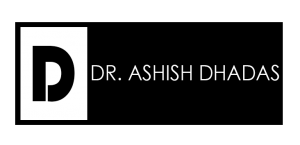
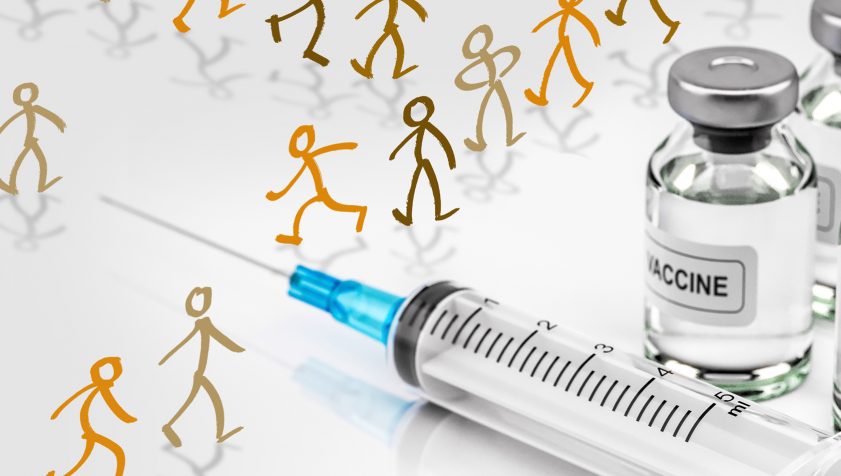

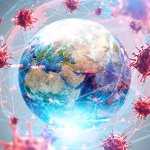
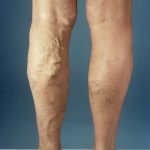
Super informative
Almost all doubts cleared .Thanks Dr.Ashish. you explained the doubts very simply.
Sir Superb Information & Beautifully Explained. Have cleared so much of doubts through this Article. Simply Great👍🏻👌🏻!!
Thank you Doctor,
It really helped me to address questions and concerns related to COVID Vaccination which I had in mind
Sir’ Too good details you have guided us….All the best hope to see more blogs of guidelines given by you.
Dr. It was really Super informative COVID Vaccination article
A comman man’s confidence booster. Genuine guidelines, Covid 19 related information with precise words of knowledge at critical times of social awareness. Thank you Sir.
Detailed explanation given in simple words for easy understanding.
Nice!
Good information Dr. Ashish
Useful and Crystal clear information regarding vaccination.Many doubts are cleared with information and stastics.Thanks Dr.Ashish for sharing.
Useful information to clear doubts about vaccines.
Yet again another insight into the present situation and a lovely way to guide people into thinking rightly.
Great job !
Thank you Dr Ashish
Was very informative and I m sure this blog will clarify everybody’s doubt on Covid vaccination even for those who are already got infected also
Sir, excellent research and presented. Appreciate your efforts and talent. Best wishes